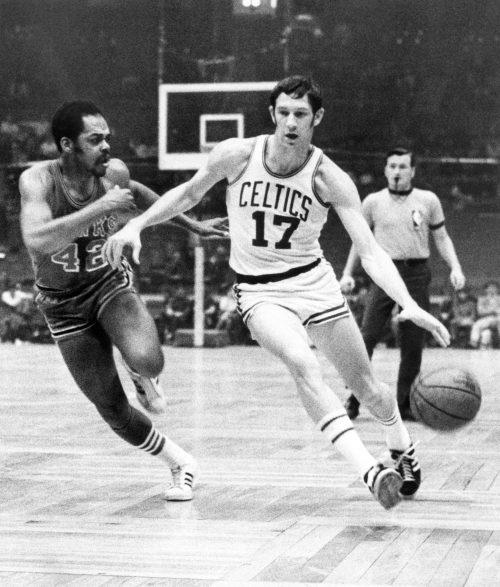Thinking of John Havlicek brings me back to when I was 11 and had a habit of hiding my transistor radio under my pillow so my father couldn’t hear it.
Usually, that meant listening to “Juicy” Brucie Bradley’s nightly Top 20 on WBZ, which was something my father loathed, as he thought I should be doing something more constructive at that hour — like, you know, studying. Or, perhaps, sleeping.
But on this night, it was Holy Thursday, and there was no school the next day. I could blast that thing all over the house for all anyone cared.
However, there was no rock ‘n’ roll that night. All there was was Johnny Most’s gravelly voice broadcasting Game 7 of the Eastern Division finals between the Boston Celtics and Philadelphia 76ers.
For those of you who still remember Johnny, he had his usual voice, and then he had one two octaves higher that he used when he really got excited. These were the days before all those cigarettes severely damaged his vocal cords to the point where they couldn’t handle that excitement anymore. But he was in his prime in 1965.
The situation was grave. Philly, with behemoth center Wilt “The Stilt” Chamberlain, was one point behind when a Celtics turnover gave the Sixers the ball (Bill Russell’s inbounds pass hit the guy wire that held the baskets at the old Garden in place).
Now, Philly, which had scored the previous 10 points to climb to within one (110-109), was inbounding the ball with five seconds left. This was more than enough time for the sure-handed Hal Greer to loft it to Wilt so he could put one of those patented finger-rolls in at the buzzer. Things were not looking good, and even Russell said later he was looking around for someone to bail him out.
Johnny was sounding forlorn as he began to describe Greer inbounding the ball, as if he knew what was going to happen. Boston’s streak of six straight championships was going to end.
“Greer putting the ball in play,” Most began. “He gets it out deep and …”
All of a sudden, bedlam. Johnny’s voice rose at least three octaves.
“And Havlicek steals it … over to Sam Jones. Havlicek stole the ball. It’s all over. It’s all over …”
Here’s the deal for me. I’m a baseball guy. Even now, if we have a day like last Sunday, and the Bruins and Celtics win playoff games, I’m not happy if the Red Sox lose a meaningless game in April. I discovered, and latched onto, the Celtics because they won championships. They were substitution therapy for me because the Red Sox stunk. I could at least point to the Celtics and say, “See? One of our teams wins.” Two years later, the Red Sox won the pennant. And even though they’ve won four World Series and the Patriots six Super Bowls since then, and the Celtics have captured 10 titles since that night, I’ve never felt the same exhilaration I felt in 1967.
If the Celtics lost, I’d be upset, not because I lived and died with them, but because they were our Yankees and they were better than nothing.
However, that night I became a Celtics fan, and John Havlicek and Bill Russell became my first real basketball idols. Wilt Chamberlain became the best villain I have ever rooted against.
I cannot count the number of times Havlicek came up big for the Celtics. I lost count of the buzzer-beaters and ceiling-scrapers. However, two moments stand out, one a loss the other ending up in a win. Both were classic games.
In the first instance, The Celtics were playing against the Milwaukee Bucks in the 1974 NBA finals (with Kareem Abdul-Jabbar). The game was double-overtime and it was basket-for-basket all the way. With seven seconds left, Havlicek almost scraped the ceiling with a rainbow shot over Abdul-Jabbar to give the C’s a 101-100 lead. If they could hold on for seven seconds, they’d be NBA champions. They couldn’t, though. Adbul-Jabbar delivered one of those skyhooks at the buzzer and the Bucks won. The Celtics, however, beat them in Milwaukee in the seventh game.
The other was 1976, the triple-overtime game against the Phoenix Suns at the Garden. It was Game 5 of the finals, and the Suns came back from a double-digit deficit to tie the game and force overtime.
At the end of the second OT, Havlicek leaned into a traffic jam of bodies under the basket and banked one in to give the Celtics a short-lived lead. It took another overtime for them to win.
In both instances, though, it was Havlicek delivering the crucial basket.
That was his career. He delivered crucial baskets, came up with big-time defensive plays, and always made the right pass. The only time I ever saw him come up short was in 1973, when the Knicks beat the Celtics in Game 7 of the Eastern Division finals. And that was because he was basically playing with one arm, after he separated his other shoulder earlier in the series.
If you’re into myth-making, you’d have to conclude “Hondo” was the prototype “Celtic,” and that Red Auerbach carved him out of stone and gave him life.
It certainly seemed that way sometimes. Hearing that he died makes me feel about 100 years older than I felt earlier this week.

